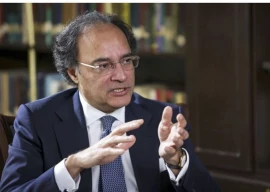
ISLAMABAD:
To discuss issues relevant to youth empowerment, a media briefing was organised a day ahead of World Population Day at a local hotel. Titled “Investing in young people,” the session was moderated by the Pakistan Television broadcaster Omar Khalid Butt.
Panelists included UN Population Fund (UNFPA) Country Representative Ann Keeling, Special Talent Exchange Programme Manager Ali Shabbar, Transgender CBO Khwaja Sira Society Monitoring and Evaluation Officer Zehrish Khan and Ministry of Education Assistant Director Faizan Hassan.
In keeping with UNFPA’s focus on adolescent well-being, and to support inclusion of a new goal for young people in the post-2015 development agenda, the theme of World Population Day this year is that Pakistan has the 6th largest population in the world and 40% are youth aged 10-29 years. The potential benefits of this demographic pattern are enormous, while the challenges are also not to be underestimated.
Butt underscored on the significance of empowering youth in building a positive, prosperous and optimistic society.
Keeling said that in 1950, the country’s population was 37 million, adding that it will exceed 300 million by the time the present youth become grandparents.
“A large percentage of adolescent girls are not in education, paid work or married. Incentives to keep such girls in secondary school would make it possible to address their nutrition, equip them with skills for life and employment and result in healthier mothers who would pass their good health, literacy and wisdom onto the next generation,” she said, adding that it would also delay the age of marriage and age of first childbirth.
Hassan talked about the government’s policies for youth employment in the public sector. He cited initiatives such as the federal government’s National Internship Programme, which enables the youth to work in the government sector, gain experience and earn a bit of money. “Youth empowerment is an attitudinal and cultural thing. There should be a youth-adult partnership for the sake of global social good,” he added.
Shabbar said people with disabilities are stereotyped in the country, and often confined to a single room. “Society is the largest barrier that needs to be fixed, it is not the disability which will remain there but the society that discriminates,” he said. He appreciated the fact that with the support of development sector and non-government organisations, the trend was shifting from special education to inclusive education, where public sector was offering merit-based job opportunities to people with disabilities beyond quota system or charity.
Khan underlined a lack of education as the stumbling block in awareness about marginalised sections of society. “We are discriminated against by our families, our society and our government,” she said, adding that the former chief justice of Pakistan Iftikhar Chaudhry enabled identity cards for the transgenders but that does not fulfill all of their rights. Their education and employment pose glaring issues to the transgender community.
In support of the “Investing in Young People” theme for this year’s World Population Day, UNFPA is launching the global “Selfie” campaign, to highlight the importance of youth as a priority in global post 2015 development plans.
Millions of “selfies” from young people, decision-makers, high-profile celebrities, media and others will be gathered to support UNFPA’s proposal for youth participation in the post 2015 global.
In his message, UNFPA Executive Director Babatunde Osotimehin emphasised youth development, saying, “Governments and the international community are increasingly conscious of the importance of providing resources and opportunities for all young people to reach their full potential as individuals and citizens. They recognise that investing in young people and enabling them to exercise their human rights not only benefits young people themselves, but can also help their countries reap a demographic dividend.”
Published in The Express Tribune, July 11th, 2014.






















































COMMENTS
Comments are moderated and generally will be posted if they are on-topic and not abusive.
For more information, please see our Comments FAQ